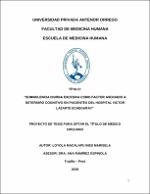Mostrar el registro sencillo del ítem
Somnolencia diurna excesiva como factor asociado a deterioro cognitivo en pacientes del Hospital Víctor Lazarte Echegaray
| dc.contributor.advisor | Ramirez Espinola, Ana | |
| dc.contributor.author | Loyola Macalapu, Ines Marisela | |
| dc.creator | Loyola Macalapu, Ines Marisela | |
| dc.date.accessioned | 2019-08-13T19:34:35Z | |
| dc.date.available | 2019-08-13T19:34:35Z | |
| dc.date.issued | 2019 | |
| dc.identifier.uri | https://hdl.handle.net/20.500.12759/5258 | |
| dc.description.abstract | Determinar si la somnolencia diurna excesiva (SDE) es un factor asociado a deterioro cognitivo en los pacientes del hospital Víctor Lazarte Echegaray. MATERIAL Y MÉTODOS: Se realizó un estudio transversal, analítico en 126 pacientes del servicio de consulta externa del Hospital Víctor Lazarte Echegaray durante el periodo abril-mayo del año 2019, a quienes se les aplicó la prueba minimental state examinación y el test de la escala de Epworth, para determinar deterioro cognitivo y somnolencia diurna excesiva respectivamente. Se estudió las características clínicas y demográficas entre los grupos de estudio. RESULTADOS: Se encontró que en el grupo de pacientes con deterioro cognitivo la edad promedio fue 74.94± 5.94 años, predomino el sexo femenino con 26 pacientes (32,1%) y el grado de instrucción primaria con 18 pacientes (30,5%), sin embargo, se reportó que 11 analfabetos (100%) presentaron deterioro cognitivo. Por otro lado, los pacientes sin actividad laboral fueron 32 (36%) y 12 pacientes con diagnóstico de diabetes (25,5%) presentaron deterioro cognitivo. En los pacientes sin deterioro cognitivo se encontró una edad promedio de 68,51 ± 5.65 años, predominó el sexo femenino con 55 pacientes (67.9 %) y el grado de instrucción primaria con 41 pacientes (69.5%), se reportó 57 pacientes sin actividad laboral (64%) y 35 diabéticos (74.5%). La frecuencia de deterioro cognitivo en pacientes con somnolencia diurna excesiva fue de 43.9% a diferencia de los pacientes sin somnolencia diurna excesiva, que fue de 11.6%. También se observó que la edad, el sexo femenino y la ausencia de actividad laboral presentaron diferencias significativas entre los grupos de estudio (p< 0.05). Se halló una dependencia altamente significativa (p=0.00005), entre la somnolencia diurna excesiva como factor asociado a deterioro cognitivo (RP 3.78 IC 95% 1.85 – 7.73) CONCLUSION: Existe asociación entre la somnolencia diurna excesiva y el deterioro cognitivo en pacientes mayores de 60 años. | es_PE |
| dc.description.abstract | To determine if excessive daytime sleepiness (SDE) is a factor associated with cognitive deterioration in patients at Víctor Lazarte Echegaray Hospital. MATERIAL AND METHODS: A cross-sectional, analytical study was conducted on 126 patients of the outpatient service of the Víctor Lazarte Echegaray Hospital during the period April-May of 2019, to whom the mini-mental state examination test and the the Epworth scale to determine cognitive impairment and excessive daytime sleepiness respectively. We studied the clinical and demographic characteristics among the study groups. RESULTS: It was found that in the group of patients with cognitive impairment, the average age was 74.94 ± 5.94 years, predominantly female with 26 patients (32.1%) and the primary education level with 18 patients (30.5%), nevertheless, it was reported that 11 illiterates (100%) presented cognitive deterioration. On the other hand, patients without work activity were 32 (36%) and 12 patients diagnosed with diabetes (25.5%) presented cognitive deterioration. In patients without cognitive impairment, an average age of 68.51 ± 5.65 years was found, female sex predominated with 55 patients (67.9%) and primary education with 41 patients (69.5%), 57 patients without activity were reported labor (64%), 35 diabetics (74.5%). The frequency of cognitive deterioration in patients with excessive daytime sleepiness was 43.9%, unlike in patients without excessive daytime sleepiness, which was 11.6%. It was also observed that age, female sex and absence of work activity showed significant differences between the study groups (p <0.05). We found a highly significant dependence (p = 0.00005), between excessive daytime sleepiness as a factor associated with cognitive impairment (RP 3.78 IC 95% 1.85 - 7.73) CONCLUSION: There is an association between excessive daytime sleepiness and cognitive deterioration in patients older than 60 years. | en_US |
| dc.description.uri | Tesis | es_PE |
| dc.format | application/pdf | es_PE |
| dc.language.iso | spa | es_PE |
| dc.publisher | Universidad Privada Antenor Orrego | es_PE |
| dc.relation.ispartofseries | T_MED.HUMA_2610 | |
| dc.rights | info:eu-repo/semantics/openAccess | es_PE |
| dc.rights.uri | https://creativecommons.org/licenses/by/4.0/ | es_PE |
| dc.source | Universidad Privada Antenor Orrego | es_PE |
| dc.source | Repositorio Institucional - UPAO | es_PE |
| dc.subject | Somnolencia diurna excesiva (SDE) | es_PE |
| dc.subject | Adulto mayor | es_PE |
| dc.title | Somnolencia diurna excesiva como factor asociado a deterioro cognitivo en pacientes del Hospital Víctor Lazarte Echegaray | es_PE |
| dc.type | info:eu-repo/semantics/bachelorThesis | es_PE |
| thesis.degree.level | Título Profesional | es_PE |
| thesis.degree.grantor | Universidad Privada Antenor Orrego. Facultad de Medicina Humana | es_PE |
| thesis.degree.name | Médico Cirujano | es_PE |
| thesis.degree.discipline | Medicina Humana | es_PE |
| dc.subject.ocde | https://purl.org/pe-repo/ocde/ford#3.02.27 | es_PE |
| renati.type | https://purl.org/pe-repo/renati/type#tesis | es_PE |
| renati.level | https://purl.org/pe-repo/renati/level#tituloProfesional | es_PE |
| renati.discipline | 912016 | es_PE |
| dc.publisher.country | PE | es_PE |
Ficheros en el ítem
Este ítem aparece en la(s) siguiente(s) colección(es)
-
Medicina Humana [2969]


